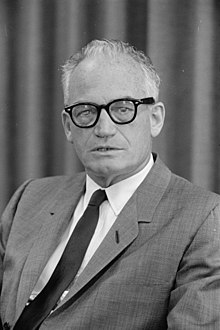CC Goldwater
| Barry Goldwater | |
|---|---|
 |
|
| Chairman of the Senate Armed Services Committee | |
|
In office January 3, 1985 – January 3, 1987 |
|
| Preceded by | John Tower |
| Succeeded by | Sam Nunn |
| Chairperson of the Senate Intelligence Committee | |
|
In office January 3, 1981 – January 3, 1985 |
|
| Preceded by | Birch Bayh |
| Succeeded by | David Durenberger |
|
United States Senator from Arizona |
|
|
In office January 3, 1969 – January 3, 1987 |
|
| Preceded by | Carl Hayden |
| Succeeded by | John McCain |
|
In office January 3, 1953 – January 3, 1965 |
|
| Preceded by | Ernest McFarland |
| Succeeded by | Paul Fannin |
| Personal details | |
| Born |
Barry Morris Goldwater January 2, 1909 Phoenix, Arizona Territory, U.S. |
| Died | May 29, 1998 (aged 89) Paradise Valley, Arizona, U.S. |
| Political party | Republican |
| Spouse(s) | Margaret Johnson (1934–1985) Susan Shaffer Wechsler (1992–1998) |
| Children | 4 |
| Alma mater | University of Arizona |
| Signature |  |
| Military service | |
| Allegiance |
|
| Service/branch |
|
| Years of service | 1941–1945 (USAAF) 1945–1952 (ANG) 1952–1967 (USAFR) |
| Rank |
|
| Unit | |
| Battles/wars |
World War II Korean War |
Barry Morris Goldwater (January 2, 1909 – May 29, 1998) was an American politician, businessman, and author who was a five-term United States Senator from Arizona (1953–65, 1969–87) and the Republican Party's nominee for President of the United States in the 1964 election. Despite losing the election by a landslide, Goldwater is the politician most often credited for sparking the resurgence of the American conservative political movement in the 1960s. He also had a substantial impact on the libertarian movement.
Goldwater rejected the legacy of the New Deal and fought through the conservative coalition against the New Deal coalition. He mobilized a large conservative constituency to win the hard-fought Republican primaries. Though raised an Episcopalian, he was the first candidate with ethnically Jewish heritage to be nominated for President by a major American party (his father was Jewish). Goldwater's conservative campaign platform ultimately failed to gain the support of the electorate and he lost the 1964 presidential election to incumbent Democrat Lyndon B. Johnson, bringing down many conservative Republican office-holders as well. Jeff Fishel says, "The conservative faction of the party was on the defensive as a result of the magnitude of the election losses."
Goldwater returned to the Senate in 1969, and specialized in defense policy, bringing to the table his experience as a senior officer in the Air Force Reserve. In 1974, as an elder statesman of the party, Goldwater successfully urged President Richard Nixon to resign when evidence of a cover-up in the Watergate scandal became overwhelming and impeachment was imminent. By the 1980s, the increasing influence of the Christian right on the Republican Party so conflicted with Goldwater's views that he became a vocal opponent of the religious right on issues such as abortion, gay rights, and the role of religion in public life. After narrowly winning re-election to the Senate in 1980, he chose not to run for a sixth term in 1986, and was succeeded by fellow Republican John McCain. A significant accomplishment in his career was the passage of the Goldwater–Nichols Act of 1986, which restructured the higher levels of the Pentagon by placing the chain of command from the President to the Secretary of Defense directly to the commanders of the Unified Combatant Commands.
...
Wikipedia
